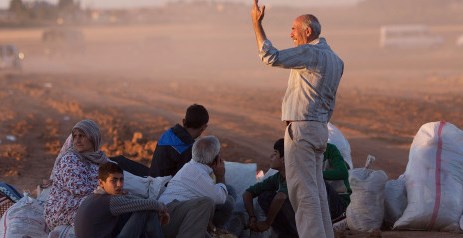Kobani still a ghost town, months after liberation from Islamic State

The Kurdish town on the Turkish-Syrian border is still a haunting, apocalyptic vista of hollowed out facades and streets littered with unexploded ordnance — a testimony to the massive price that came with the victory over ISIS.
There is no electricity or clean water, nor any immediate plans to restore basic services and start rebuilding.
While grateful for the U.S. airstrikes that helped turn the tide in favor of the Kobani fighters and drive out ISIS militants, residents say their wretched situation underscores the lack of any serious follow-up by the international community in its war against ISIS.
“First, Islamic State fighters were holed up in our home and then the American planes bombed it,” said Sabah Khalil, pointing from across the border in Suruc, Turkey, to where her family house in Kobani is now a pile of crumpled cement.
“Who is going to help us rebuild? That’s what everyone is asking,” she added, sitting on a stone outside her tent, soaking in the spring sun as children in tattered shoes played nearby.
For four ferocious months, Kobani was the focus of the international media after ISIS militants barreled into the town and surrounding villages, triggering an exodus of some 300,000 residents who poured across the border into Turkey.
The battle for Kobani became the centerpiece of the campaign against ISIS.
Dozens of TV crews flocked to the Turkish side of the border and from a hill, trained their cameras on the besieged town, recording plumes of smoke rising from explosions as the U.S.-led coalition pounded ISIS hideouts inside the town.
In late January, the Kurdish fighters finally ousted the Islamic State from the town — a significant victory for both the Kurds and the U.S.-led coalition. For ISIS, which by some estimates lost around 2,000 fighters in Kobani, it was a defeat that punctured the group’s image and sapped morale.
But the price was daunting.
Today more than 70 percent of Kobani lies in ruins. More than 560 Kurdish fighters died in the battles.
About 70,000 of the refugees have returned to the town and surrounding areas, some only to pitch tents outside their destroyed homes, according to Aisha Afandi, co-chair of the Kurdish Democratic Union Party, or PYD.
With no outside help, the Kurdish fighters use primitive tools to dismantle mines and booby traps left behind by ISIS militants. The rotting bodies of dead fighters are still trapped under the rubble, and as the weather gets warmer, there are concerns of spreading disease.















































